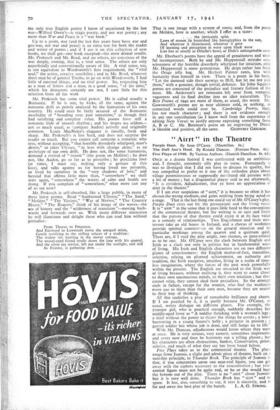" Airrt " in the Theatre
Purple Dust. By Sean O'Casey. (Macmillan. 6s.)
ONCE at a drama festival I was confronted with an ambitious and, I thought, extremely silly play in verse. Fortunately it was so ill-staged that I did not have to discuss its quality, but was compelled to prefer to it one of the orthodox plays about village postmistresses or supposedly mcribund old persons with a bit of money ; but a disgruntled player said to me afterwards, " It is eyvident, Adjudicatorr, that ye have no appreciation o' aim in the theatre."
If I am ever suspicious of " airrt," it is because so often it has chosen the wrong medium, and gains nothing from being acted on a stage. That is the last thing one could say of Mr. O'Casey's play. Purple Dust cries out for the proscenium and the living voice. It is " airrt " in the sense that it pays little heed to the conventions of the commercial theatre, but the writing is so sure and lively that the patrons of that theatre could enjoy it at its face value as a comedy of relationships. Two Englishmen and their mis- tresses take an old house in Ireland, and a chorus of workmen provide spirited commen'ary on the general situation and its particular workings among the quartet and a quintum quid. There are, if I read the play aright, two themes, so inter-related as to be one. Mr. O'Casey sees the clash between English and Irish as a clash not only in politics but in fundamental ways of living. His Irish and English characters are on two different planes of consciousness : the English matter-of-fact, masculine, selective, relying on planned achievement, on authority and tradition, the Irish receptive, intuitive, living in a realm of time- less imagination, where the forces of the past work powerfully within the present. The English are attracted to the Irish way of living because, without realising it, they want to come closer to their own unconscious minds, to their own intuition • but they cannot relax, they cannot shed their prejudices. So the attempt ends in failure, except for the women, who find the workmen more use to them than their own men, because they are nearer to their way of thinking.
All this underlies a play of remarkable brilliance and charm. If I am puzzled by it, it is partly because Mr. O'Casey, as usual, writes dialogue on different planes. For example, the younger girl, who is practical enough, suddenly describes her middle-aged lover as " A toddler thricking with -awoman's legs ; a thief without the power to thieve the things he covets ; a louse burrowing in a young lioness's belly ; a perjurer in passion; gutted soldier bee whose job is done, and still hangs on to lie."
With Mr. Duncan, adjudicators would know where they were at once. He is very serious, very earnest, sometimes impressive, and every now and then he hammers out a telling phrase ; but his characters are often abstractions, banker, Conservative, priest, scholar, and much of what they say has been heard before.
Five Plays takes us to the commercial theatre. The plays range from Yeannie, a slight and adroit piece of.theatre, built on a sure-fire principle, to Thunder Rock. The principle of Jeannie is that, if you concentrate upon one near-real figure, you can get away with the ciphers necessary to the concentration ; but your central figure must not be quite real, or he or she would bust the bottom out of the play. There is rio " aim " about Partnie, but it is very well done. Thunder Rock has " aim " and to spare. It has, also, something to say, it says it sincerely, and is far and away the best play of the bunch. L. A. G. STRONG.






























 Previous page
Previous page